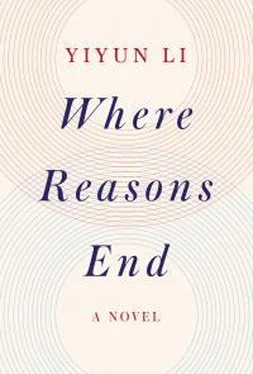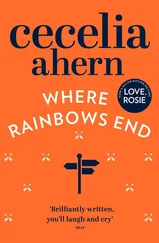I’ve never called life unlivable, he said. I’ve never lived a single day without something that matters to me, something that I live for.
But not a single day with just the frivolous?
What in my life would belong only to the frivolous?
Not music, I thought. Nor literature, nor sport, nor friendship. Baking? Cooking? Knitting? Gardening? Shopping for kitchenware, yarn, scarves, colorful socks? Choosing gifts for friends? Intensity makes frivolousness unattainable. Yet all those that have meanings have weight, too. Can a ship sail when it is loaded with what it is not equipped to carry?
I have sailed, he said, in my way.
Had there been a time when I should have known that what he called his way bode ill? When he, after watching the movie Les Misérables at twelve, had read the novel three times over the summer? Or even earlier, when his fourth grade teacher had sent me poems he had written, speaking of inconsolable bleakness?
Gosh, boding ill? I was only being me, he said.
Is it a fatal condition, I thought, for some people just being themselves?
And Les Misérables, he said. It makes me feel young again.
The novel was on his shelf now, with a small metal bust of Victor Hugo nearby. There was a collection of George Herbert’s poetry, which he had picked out from my shelf around the same time as Les Misérables, yet to be studied. There were rolls of unknit yarn, volumes of untried recipes, years of unlived life.
Don’t dwell upon the prefix, he said.
What?
You can add “un” to many words and undo yourself.
Undo, I thought. Undone. They were among the words that I did not say aloud, yet I had heard them used in connection to Nikolai. Even if people could refrain from saying them, these words were still not far, hovering with patience. Words are falcons, our minds the trainers.
No, our minds are the targets, he said, the prey.
Who trains the words then?
I don’t know, he said.
I couldn’t decide if the answer was an indication that he was losing interest, or he felt defeated. Perhaps the former, I thought. He had never given up an argument from defeat.
Undo is an overused word in any case, he said. You might as well say unfollow or unfriend.
Different, I said. You can easily unfollow or unfriend someone. You cannot undo many things in life. Most of life.
What can be unfollowed or unfriended doesn’t matter, he said. These words, heaven knows they are really made-up words. They seemingly give you an option, but that option is not available when it comes to what you truly need to unfollow or unfriend.
Like what?
Death, he said.
If death cannot be unfriended or unfollowed, I said, shouldn’t life be the same way?
I did not unfriend or unfollow life, Mommy. Had I done that you would not have found me. We would not have been talking.
What is it then you unfollowed and unfriended? I asked. If not life. If not death.
Time.
Time? I said.
Yes, time, which does not come at a price.
Unfriending it, unfollowing it, does it come at a price?
I don’t know, Mommy. It’s not for me to say.
13
Aftertime
I didn’t get you presents for Christmas, I said.
It goes without saying, don’t you think? Nikolai asked.
If it truly goes without saying, I said, I wouldn’t have said it. It goes without saying—certain words are put together to say what they don’t mean, or to mean what they don’t say.
Trust me, he said. Every time someone says, Trust me, I want to ask, Why should I?
To be honest with you, I said.
With all due respect, he said.
I don’t want to dismiss or diminish your struggle, I said.
How words waste space, he said.
Yes. And if I want I can go on and on.
A grownup is better at that than a child, no?
Yes, I said.
So, back to what requires saying. No present for me from Santa this year?
You’ve never believed in Santa.
I almost believed when I was little, he said.
When Nikolai was in preschool, he had once grilled me about how Santa could possibly visit all the children in one night.
I remember that, he said. You told me as long as I believed it, Santa would bring presents.
Did you believe then?
Not really, but I got my presents so I knew it was all made up, he said. I was worried for a few days. I worried that I would not get presents because I did not believe in Santa.
I didn’t know these thoughts were going on in your head, I said.
It would be the end of a child’s life had his parents known everything going on in his head, Nikolai said.
The next year I had received emails from several parents of his kindergarten classmates, alerting me that he had been spreading the news that there was no Santa. In our household we still follow the tradition, one mother wrote, and added that her daughter had come home with so many questions, including who eats the cookies and drinks the milk in the middle of the night, if not Santa.
So you enlightened me on the importance of keeping my friends in the dark, he said.
There’s nothing wrong with parents wanting to prolong the childhood of their children, I said.
When I was in fourth grade I thought something must be wrong with my childhood, he said. It was too happy, never like what you read in literature.
I remember you saying that, I said. Is it parents’ failure, I thought, if they’ve given their children a happy childhood that does not last?
A childhood ends, he said. Even the best parents can’t change that. Sooner or later receiving Christmas presents is just for the sake of opening boxes. Inevitable is your favorite word for such things.
Sometimes you want inevitabilities to happen later rather than sooner, I said.
A mother we had met recently, who had lost a teenage son to suicide, had told us that every Christmas she would bring out his stocking with years of gifts, and she would add something new each year.
Don’t do it, Nikolai said.
I’m not going to, I said.
I was not an organized person. The other day I realized I couldn’t find Nikolai’s stocking. Many things slipped away like sand or water, but did it matter?
Sand and water, Nikolai said.
I know, I said. Sometimes you can’t avoid thinking in clichés.
They are clichés if you use them to describe time, he said. You’re using it to describe a concrete object, which does not move itself.
Okay, I said, okay.
I’m sure the stocking is somewhere, he said. It can’t be nowhere.
If you don’t know the precise location of that somewhere, does it become nowhere? I asked.
It’s still somewhere.
What do you call a place between somewhere and nowhere? I asked.
Between somewhere and nowhere—on some days that place feels more abysmal than on other days.
Anywhere between somewhere and nowhere would still be somewhere, he said.
Are you somewhere too?
Of course, he said. Nowhere is like infinity and beyond. It’s possible to be closer if you try. It’s impossible to arrive nowhere.
But it must be a somewhere different from this somewhere, I said. I mean, where I am. Here and now.
I was sitting in a room with books, and I was facing the window. On the windowsill was a vase of hydrangeas. A few minutes ago a woodpecker had been pecking a tree trunk nearby. And now a squirrel was digging with a frenzy, never pausing at a spot for more than two seconds. The weather for the next day, which was winter solstice, was forecasted as sunny. The year would end in ten days.
If it comforts you, I can make up something about my somewhere, he said. Here’s a pond, yonder is the sky.
Just like the painting you did.
Which one?
When I was unpacking Nikolai’s paintings, I had found one that I had not seen before. It had been done when he was much younger, as he had confidently misspelled his own name in capital letters on the canvas. There was the golden sky streaked with green, the red-golden field with an inset of an emerald-green pond, three brownish-golden barns towered by a golden and green tree twice the height of the barns. A child, taller than the tree, stood with a startled look on his face, his body the shape of a Christmas tree and decorated with golden ornaments, and on top of his head, instead of hair, he wore a bow tie the size of his entire body, purple with golden polka dots. Such an audacious and disturbed boy.
Читать дальше












